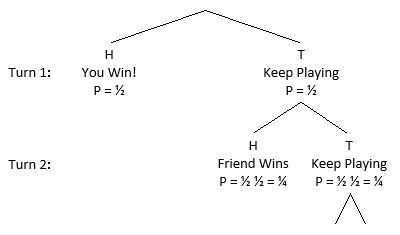A Coin Flipping Game
You and your friend play a game where you take turns flipping a fair coin. If it's tails, the other player gets to take a turn; if it's heads, the current player wins and the game is over.
If you go first, what is the probability that you will win?
If this probability can be expressed as b a , where a and b are coprime positive integers, enter your answer as a + b .
The answer is 5.
This section requires Javascript.
You are seeing this because something didn't load right. We suggest you, (a) try
refreshing the page, (b) enabling javascript if it is disabled on your browser and,
finally, (c)
loading the
non-javascript version of this page
. We're sorry about the hassle.
2 solutions
Nice solution!
Log in to reply
Thanks! By a similar argument, if there are n players involved then the probability that the person who plays first wins is 2 n − 1 2 n − 1 .
Log in to reply
It's the same probability formula if you keep the game to two players but require them to flip the coin n - 1 times per turn and a win is getting all heads on one turn. Wow!
The following probability tree can be constructed:

On the first coin flip, there is a 2 1 probability that you will flip heads and win, but a 2 1 probability that you will flip tails and the game will continue. If the game continues to a second coin flip, your friend has 2 1 ⋅ 2 1 = 4 1 overall probability that he will flip heads and win, but a 2 1 ⋅ 2 1 = 4 1 overall probability that he will flip tails and the game will continue. If the game continues back to your turn, the probabilities are the same as your first coin flip but at a 4 1 ratio. Since the game could potentially continue on forever in this manner, the probability of you winning can be expressed as an infinite sum:
P = 2 1 + 4 1 ( 2 1 + 4 1 ( 2 1 + 4 1 ( . . .
Substituting P into the above equation gives:
P = 2 1 + 4 1 P
and solving this equation for P gives P = 3 2 , and 2 + 3 = 5 .
Let P 1 be the probability that you win and P 2 be the probability that your friend wins. If you toss tails, (probability 1 / 2 ), then if we imagine that the game was "reset" then your friend would win this "reset" game with probability P 1 . This implies that P 2 = 2 1 × P 1 .
Now as one of you will win eventually we have that P 1 + P 2 = 1 ⟹ P 2 = 1 − P 1 ⟹ 2 1 × P 1 = 1 − P 1 ⟹ P 1 = 3 2 ⟹ a + b = 2 + 3 = 5 .